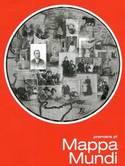Mappa Mundi
There are some plays that are captivating in their utter simplicity and yet also arresting in their poignancy. Mappa Mundi is one such play. This delightful story of an old man struggling to come to terms with death and to be reconciled with his past is exquisitely portrayed on stage. Having seen some terrible theatre over the last few weeks, it was wonderful to have my thespian faith restored with this production. There is simply no better medium than the theatre to portray the magnitude of the human condition, as Mappa Mundi constantly proves during the two hours of its performance.
Jack, played by Alun Armstrong, is a 72 year old father, who is coming to terms with his own mortality. He is proud of his English ancestry and delights in proving his pedigree by tracing his family tree. His two children are not so proud to discover that one of their forebears was an American slave owner, but Jack is not discouraged by this 'blot' on the family record. As he repeats a number of times through out the play "You cannot judge the past by the present'. However, sadly for Jack, he is more concerned about a 'stain' on the family record, which is of his own making. A terrible secret he has kept hidden from his family for decades, but now that death is approaching, he needs to unburden his soul.
Alun Armstrong plays the part of the old man as if he himself was old. He shuffles and moves with all the feebleness of old age and illness, and one can almost see in his eyes the ghost of past memories dancing around his mind as he sits and stares into the distance. He portrays anger, grief, confusion, remorse and pain without the use of any histrionics. He has fully become his character, a tired old man struggling with a painful past and trying to find some meaning to his life. This is an impressive performance not to be missed.
The drama takes place within the walled English garden of the house belonging to Jack's forty-year-old daughter Anna, played by Lia Williams. Anna is about to marry Sholto, a black lawyer who specialises in asylum law. She is very uncomfortable about having a slave owner in the family tree, and finds some redemption for her ancestral guilt by clinging to the belief that her great, great, great grandfather had married one of his slaves. Anna is obsessed with the idea that she and her family where begotten by a black woman. Not surprisingly, her fiancé and his mother find this idea patronising, and cannot understand why she is so earnest in proving some black descent.
Tim McInnerny plays 'Michael', Jack's miserable divorced actor-son. He fully depicts the tensions in father-son relationships. Despite his protestations of dislike towards Jack, he watches his father's decline with loving concern. When Jack makes an attempt to seek some reconciliation with his son, Michael responds with all the hope and longing of a small child wanting his father's approval.
The character of Father Ryan, excellently played by James Hayes, brings some delightful humour to the play. He sits and politely passes the time of day with Jack, despite Jack's cantankerousness. When towards the end of the play he confesses, much to Jack's surprise, his loss of faith he gleefully looks forward to giving up his pretence of compassion and being able to say to some contemptible, bad mannered parishioner, "Fig off, you miserable old git!" One can see the relish in his eyes at the thought of the new-found liberty his loss of faith as provided.
Maps are an image of a place we are going to, or a place we have visited. They represent both our plans and memories. Jack finds that he now spends all his time looking at places he has visited, that his life is now finished, and with tears he exclaims, "I thought it would amount to more than this!" Yet, despite the pain and grief, the acceptance of death and the loneliness of old age one cannot help but feel hopeful that the map of Jack's life will continue, with his children and grandchildren.
The final scene of the wedding, when a group of multi-ethnic performers dance in a circle on the evening of Anna's wedding suggests that we are all a part of the whole, future and past, good and bad, black and white. The dance of life continues even as we walk into the darkness.
My one complaint of the play is that there are too many issues: race, slavery, asylum, family relationships, guilt, remorse, faith etc. A few less strains would help the harmony of the play. As it is the main melody, which is the struggle of Jack to come to terms with his past and mortality, is stirring enough, due to Alun Armstong's exceptional performance, to make the whole evening rapturous.
Alan Bird
What other critics had to say.....
NICHOLAS DE JONGH for THE EVENING STANDARD says, "Thoughtful and sardonically amusing play.....Alun Armstrong's tremendous, rending performance.." MICHAEL BILLINGTON for THE GUARDIAN says, "A humane, compassionate play that makes up in psychological perception what it lacks in external excitement." IAN JOHNS for THE TIMES says, "Low-key, bitty production....Stephenson's play is a slow burner that fails to ignite." JANE EDWARDES for TIME OUT says, "Not as moving as it should be." PAUL TAYLOR for THE INDEPENDENT says, "Mappa Mundi leaves you feeling oddly disengaged." JOHN THAXTER for THE STAGE says, "Gently probing family drama."
External links to full reviews from popular press
Originally published on
